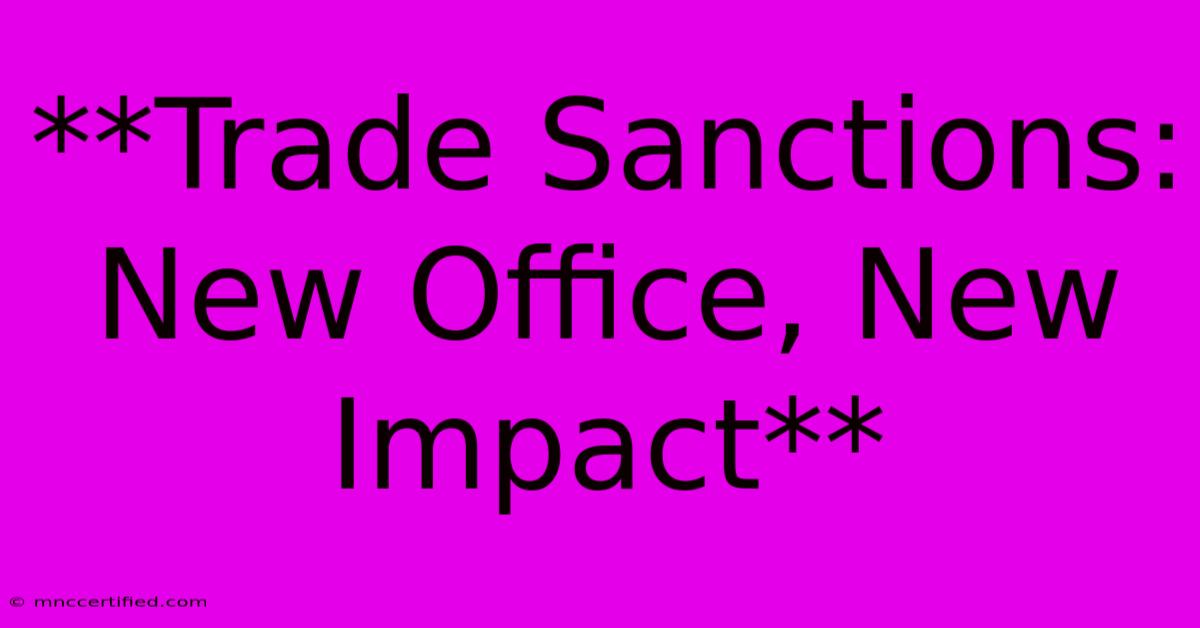**Trade Sanctions: New Office, New Impact**

Table of Contents
Trade Sanctions: New Office, New Impact
The landscape of global trade is constantly evolving, and in recent years, trade sanctions have become a prominent tool in international relations. These sanctions, often imposed to pressure countries into changing their behavior, can have a profound impact on the global economy, businesses, and individual lives.
The Office of Foreign Assets Control (OFAC): A New Era in Sanctions Enforcement
At the heart of the US government's sanctions regime lies the Office of Foreign Assets Control (OFAC), a division of the US Department of the Treasury. While OFAC has long been responsible for implementing and enforcing economic sanctions, recent years have seen a significant increase in its activity and its impact on global trade.
Increased Scrutiny and Enforcement:
The Trump administration marked a shift towards a more assertive approach to sanctions, with OFAC expanding its focus and intensifying enforcement efforts. This trend has continued under the Biden administration, with a particular emphasis on human rights violations, cybercrime, and national security threats.
New Developments and Impacts:
- Expanded Sanctions Targets: OFAC has broadened its sanctions targets beyond countries to include specific individuals, businesses, and entities deemed to be involved in prohibited activities.
- Secondary Sanctions: OFAC has also expanded its use of "secondary sanctions," targeting businesses outside the US that engage in certain activities with sanctioned entities.
- Increased Fines and Penalties: The penalties for violating OFAC sanctions have become more severe, with companies facing massive fines and individuals facing criminal charges.
The Impact of OFAC Sanctions on Businesses:
Compliance with OFAC regulations is now more critical than ever for businesses of all sizes. Companies must carefully vet their customers, suppliers, and business partners to ensure they are not dealing with sanctioned entities. They must also establish robust compliance programs, conduct ongoing due diligence, and maintain accurate records.
Navigating the Complexities:
- Understanding the sanctions landscape: The ever-changing nature of OFAC regulations requires businesses to stay informed about current sanctions programs, their scope, and any updates or changes.
- Developing comprehensive compliance programs: Businesses need to develop thorough compliance programs that encompass risk assessments, due diligence procedures, training, and internal controls.
- Seeking expert advice: Engaging with experienced legal and compliance professionals can help businesses navigate the complexities of OFAC sanctions and ensure they are taking all necessary steps to comply.
Beyond OFAC: The Broader Impact of Trade Sanctions
The increased use of trade sanctions has significant implications for the global economy and international trade.
- Economic disruption: Sanctions can disrupt supply chains, increase costs, and limit access to markets.
- Humanitarian consequences: Sanctions can have unintended consequences, impacting the lives of ordinary citizens and hindering access to essential goods and services.
- Geopolitical tensions: Sanctions can escalate tensions between countries and make diplomatic solutions more difficult.
The Future of Trade Sanctions:
Trade sanctions are likely to remain a powerful tool in international relations, and businesses need to be prepared for their continued use. Staying informed about current regulations, establishing robust compliance programs, and seeking expert advice are essential steps for navigating this complex landscape.
The changing landscape of trade sanctions underscores the need for businesses to prioritize compliance and vigilance. By understanding the risks and taking appropriate measures, companies can minimize their exposure to potential penalties and navigate this evolving environment effectively.

Thank you for visiting our website wich cover about **Trade Sanctions: New Office, New Impact**. We hope the information provided has been useful to you. Feel free to contact us if you have any questions or need further assistance. See you next time and dont miss to bookmark.
Featured Posts
-
Chapter 8 Covalent Bonding Answer Key Pdf
Nov 07, 2024
-
Musks Trump Celebration Boosts Dogecoin 8
Nov 07, 2024
-
Biden Granddaughter Announces Election Day
Nov 07, 2024
-
Naomi Biden Announces Election Day
Nov 07, 2024
-
Ranked Choice Voting Remains In Bloomington
Nov 07, 2024